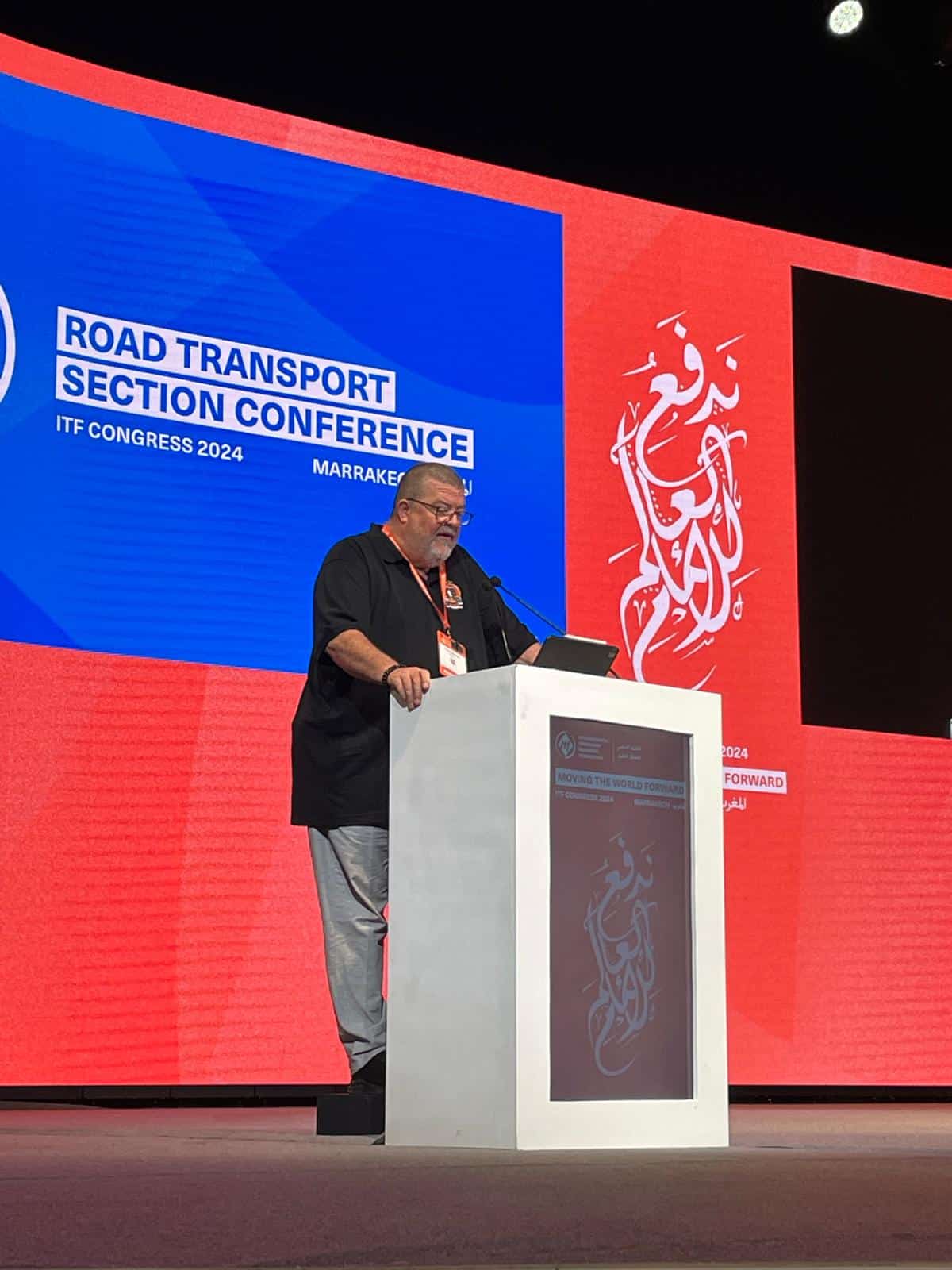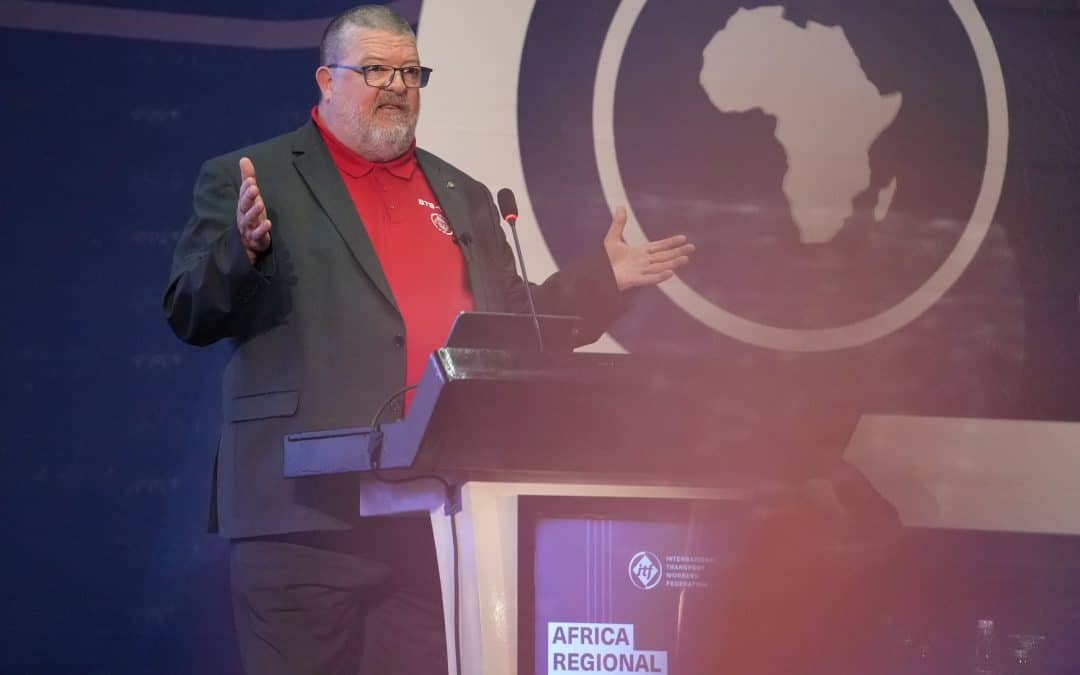The ITF is launching a global action week for Safe Rates from Aug. 26 to Sept. 1, 2024. The action week marks a pivotal moment in road transport safety with the introduction of Australia’s comprehensive new Safe Rates system.
This legislation, supported by the government, workers, and industry stakeholders, sets fair pay and conditions for the entire road transport sector, including the gig economy. It’s a significant step towards making our roads safer and ensuring sustainable working conditions.
Below you can find the speech I gave at the conference in Australia.
Let me first tell you that for BTB this “safe rates” campaign is a combination of multiple factors.
- Safe rates
- Road Transport Due Diligence
- Economic employers’ accountability
And it is a possible solution to end social dumping in Europe
The principle of safe rates is important in Europe nowadays. That is because of two very important elements in the European transport sector today: the booming of the transport and logistics sector and the “import” of cheap labour in the transport sector.
Speaking about the booming of the transport and logistics sector: 75% of transport operations in Europe are done by road. So road transport is crucial for the economy. However employers talk about a shortage of drivers, because they can not find enough workers to drive the trucks. In Europe there are actually 233.000 vacancies for professional drivers. Jobs that could be created, but there are no workers available to fill in the jobs. There are even predictions about 745 000 open jobs in 2028.
Even employers’ organisations have to admit that this lack of drivers is not only due to a booming market, but mainly because older drivers retire and young workers are not willing to fill in the open jobs.
In our opinion, drivers’ shortage is a false way of looking at the problem. We rather mention the shortage of “good jobs”. This explains the fact why young people do not want to work in our industry. They are discouraged by the low wages, the bad working conditions, the long working hours and the extreme flexibility. We have to emphasize that in well-paid sectors there is no shortage of staff. There is no problem in finding people willing to work as a docker in Belgium for example.
And then there is the problem of import of cheap labour by the employers. We talk about social dumping in road transport. This is encouraged because of the race to the bottom on the transport prices. Transport must be cheaper and cheaper. The working conditions and the wages of the drivers are the first to experience the negative effect of this race to the bottom.
In Europe social dumping is frequently organized in the transport sector by transport companies hiring drivers from cheap labour countries. It started with Eastern European workers driving in Western Europe, but with Eastern European wages and working conditions.
Then came the so called “third country” drivers, workers from countries outside of the European Union.
Today we even talk about African and South-East Asian truck drivers working in Europe for wages and working conditions far lower than the standard.
I can give you the example of 100 drivers in Liège, who were sacked via a Whatsapp message by a subcontractor of Amazon called KM Group. Amazon lowered unilaterally the transport price they pay to the subcontractor. The consequence was that the subcontractor could no longer transport the goods for the price Amazon was willing to pay.
Another example is that of the Gräfenhausen strike, where for the first time in history East European drivers went on strike against the Polish transport companies Lukmaz, Agmaz and Imperia, all owned by the same owner by the way. They went on strike because they were not payed as it should be, and because of bad working conditions.
These subcontractors were in fact operating for big multinational companies like Ikea, Volkswagen, DHL, LKW Walter, Sennder and CH Robinson.
I can tell you about 300 Philippino drivers recruited to work in Europe. Our Danish colleagues from 3F discovered a facility where 300 drivers were staying during the weekend. The exploitation of these workers by human trafficking was largely documented by 3F and ITF.
Recently we heard that Kenyan drivers are recruited to come to work in Europe on false promises. The reality is that, when they come to work in Europe, they will be the victims of exploitation.
This social dumping kills the transport sector and makes working conditions even worse. It makes staff shortage even bigger. Who wants to work in a sector where exploitation is becoming more and more the standard instead of the exception?
The big question now is what strategies European unions can follow based on these observations?
- We need to go for a better legislation on a national and on a European level.
- We need to interpell employers and employers’ organisations.
- We need to go after the “clients” in the transport sector, the so called “economic employers”.
To enforce a better legislation on a national and European level also means that on a national level, we have to negotiate higher minimum wages and push the governments to put more resources in social and labour inspections.
On a European level we have negotiated the Mobility Package to fight social dumping. We can now also use the European Platform Economy Directive to clean up the sector. But we also need to put more effort into control and enforcement. ELA, the European Labour Authority, is actually not able to play the role of a real European inspection service, so on that level, there is work to be done.
Also on a European level we need to interpell the employers to higher the wages in the sector by means of sectoral negotiations. We need to negotiate with employers’ organisations to create a level playing field to end social dumping, which is much more than false competition.
Both my union, BTB, and the European Transport Federation ETF, are working on this. We talked with IRU (international transport employers’ organisation) and several other employers’ organisations about the safe rates campaign, pointing out the advantages for them. This dialogue already started in 2023 and is still continuing with different meetings planned the coming months.
We will need to go after the “clients” or the “economic employers” in the supply chain. Multinationals like I already mentioned before (Ikea, Unilever, BMW, Danone, …) must take responsibility for what happens in their supply chain.
We must “blame and shape” the bad operations, like we already did with Ikea.
The foundation, financed by ITF, gathers facts and figures about the multinationals’ supply chain to confront them with the real practices for which they are also responsible.
For us, the ITF Safe Rates Campaign is an instrument to tackle the problems I just enumerated.
Safe rates guarantee a salary that ensures the workers of a decent income, enabling drivers to pay their bills at the end of the month.
Safe rates exclude the hyper-flexibility, unreasonable overtime, … and thus create more road safety.
Safe rates need to be guaranteed or supported by legislation.
Transport companies need to be forced to follow the safe rates legislation.
Safe rates will force economic employers to pay the correct price for transport and logistic operations.
Safe rates need to be controlled by governmental inspection services and trade union inspectors.
Yesterday 65 BTB shop stewards gathered in Brussels for a “safe rates” conference, which means that my union is fully engaged in this “safe rates” campaign.
Hereby I do confirm that BTB will fully stay engaged in this important ITF campaign.










